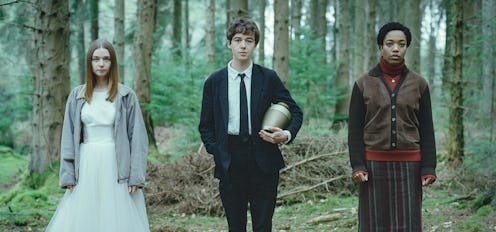Entertainment
How ‘The End Of The F***ing World’ Became A Show About Grief, Not Murder

No one eats food in The End of the F***ing World Season 2. When people get into a car, no one knows where to drive it. It's been two years since the bleak Season 1 finale, and the show's characters are too rudderless with grief. Alyssa (Jessica Barden) keeps reliving Professor Clive Koch's attempt to rape her. James (Alex Lawther), who has spent the intervening years recuperating from his Season 1 gunshot wounds, loses his father almost as soon as he relearns how to walk. And new character Bonnie (Naomi Ackie), the professor's vengeful girlfriend, is committed to killing Alyssa and James for what she considers his murder. The listless trio are brought together by The End of the F***ing World's pitch-black comedic plot, but it's their suffering that binds them.
After his father has a heart attack, James can't bring himself to go inside the family home. He starts living in their second-hand sedan; the postman drops letters through the window, and he keeps a brushed brass urn of his father's ashes as a roommate. James is stuck in a liminal space: he wants to scatter the remains, but doesn't know where. He's not homeless, but he can't enter his own house. As soon as he sees an excuse (in this case, a bullet with his name engraved that's delivered to his car in the mail), he seeks out Alyssa. The worry that she's in danger gives him a sense of direction. He's still in the car, but now it's in drive: to find Alyssa, to protect Alyssa, to finally profess his love to Alyssa. Tellingly, he brings the ashes with him.
Alyssa is about to get married when James finds her. She complains that she used to know herself, but now doesn't feel much of anything. James picks up on it almost immediately: "It was like someone took her batteries out." If James bypasses mourning by focusing on Alyssa, Alyssa's plan is to keep running, keep hoping that the next decision she makes will magically be the one to leave her feeling better. After ditching her wedding reception, she sits in a diner in her billowy white dress, staring into her burger and milkshake. She deflects when James asks her why she got married, but in voiceover, she's more truthful: "I had to do something." She doesn't sound like Alyssa, sulky and defiant, but like James, wondering in early Season 1 if he's a sociopath and plunging his hand into a deep fryer just to check: "I wanted to make myself feel something."
As deranged as Bonnie's affair with the professor was, it's the closest approximation to love she's ever known. Her grief takes the form of a vendetta. Bonnie doesn't touch the Chinese food she orders or the scone she accepts from Alyssa. It's revenge — easier for her to process than loss — that keeps her going. When Bonnie eventually collapses onto the floor after James and Alyssa reveal the truth about Clive's death and disarm her, it's not the thwarted revenge plot she laments. It's the loss of her motivation. "I'm really tired," she tells her would-be victims, still lying on the diner floor.
As in Season 1, the road feels like its own unnamed character, with vast and suburban Surrey replaced this time by close shots in the Forest of Dean. Instead of the open road of opportunity, we get something darker and less navigable. For a "couple of months,'' James can't even bear to back the car out of the driveway. "Let's get out of here," Alyssa instructs James when he picks her up on the side of the road looking like a runaway bride. When he asks her where she'd like to go, though, she answers with a bewildered "Wot? I don't know. I just wanted to leave." Even for Bonnie, fueled with purpose, the car is a moment of crisis. When she climbs in with Alyssa and James for the first time — after posing as a hitchhiker — she can only think to tell James to take her "anywhere."
It's only in the final episode that a sense of direction is restored, a path through The End of the F***ing World's varied manifestations of grief. Alyssa finally knows where she has to go in order to say goodbye to that piece of her that's still reliving her attack: the site of her trauma. She rinses herself in the professor's pool. When James finds her there, they visit the underpass that used to be the park where his parents met, where they finally scatter his father's ashes. Only with their respective goodbyes behind them is there room for them to know themselves, to listen to their hearts and their bodies. James apologizes for putting the burden of being "the answer" on Alyssa. She turns to James, breaking the perfect symmetry of the shot, and at last says, "I'm really hungry."
"Me too," he tells her.